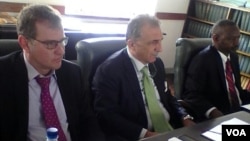Finance Minister Patrick Chinamasa has assured the international monetary fund that Harare will reduce its public sector wage bill and improve fiscal discipline.
But a leading economist says Harare and the International Monetary Fund (IMF) are focusing on the wrong issues.
Chinamasa told a visiting IMF team in Harare on Wednesday that the public sector wage bill would be slashed from 82 percent of government spending currently to 52 percent of expenditure by 2019.
The IMF team has been in the country since February 24th. The IMF’s head of mission to Zimbabwe, Domenico Fanizza, said Harare has met its targets.
Harare has also set an ambitious plan to repay arrears amounting to $1, 8 billion to international lenders by April this year.
Senior economics lecturer at the University of Zimbabwe and a government consultant, Dr. Gift Mugano, told Studio 7 that focus must be on growing the economy not just the wage bill.
“It’s not about cutting expenditure for Zimbabwe. It’s about addressing the root causes of where we are. We should not be cutting. We should not bemoan the expenditure of 83% as a big problem. I am quite concerned that the IMF is making a lot of problems about this issue without providing solutions which must be centered on productivity.
"You cannot make an argument over a budget of US$4 billion, which is the size of a company in South Africa. We have no budget to talk about. If we raise our national budget to $8 billion ... This budget (civil servants) will remain the same. It will align itself by 50% without cutting anything.”
Meanwhile, the IMF says economic difficulties have deepened in Zimbabwe. In a statement to mark the end of a Staff-Monitored Program visit to the nation, the IMF said Zimbabwe cannot wait and needs to act now.
It noted that the El Niño-induced drought has hit the economy hard, adding that lower commodity prices and the appreciation of the U.S. dollar have compounded difficulties.
The IMF said policy action is needed to reverse this trend. Once the SMP is completed successfully — as an initial step toward reform and re-engagement with international partners — a comprehensive and ambitious economic transformation program is needed to revive the Zimbabwean economy and to cement support among international partners.
It also pointed out that the authorities have met all quantitative targets and structural benchmarks under the third and final review of the Staff Monitored Program.
Moreover, said the IMF, Zimbabwe has started to develop a medium term economic transformation program, in line with the broader reform agenda presented at the Lima meetings on arrears clearance in October 2015.
As a result, it said fiscal discipline is the key priority. Given the lack of resources, the authorities need to keep the cash primary accounts close to balance.




